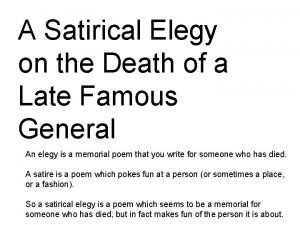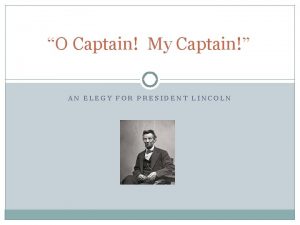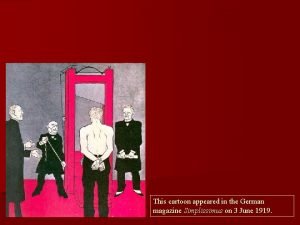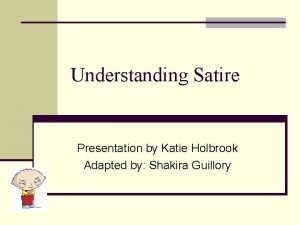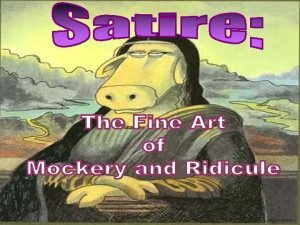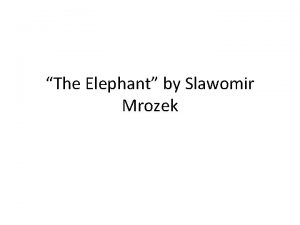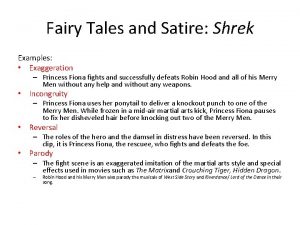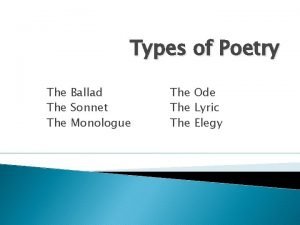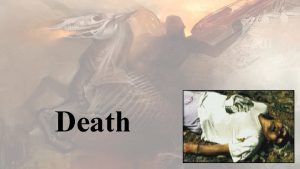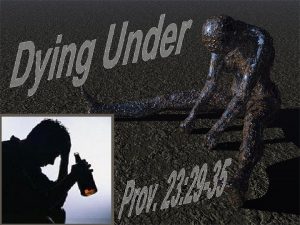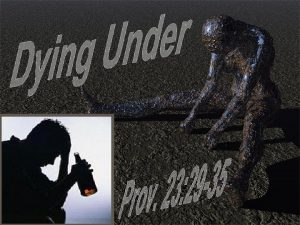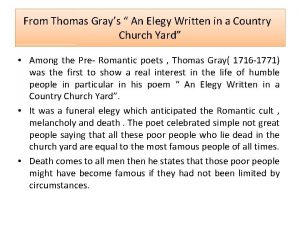A Satirical Elegy on the Death of a
















- Slides: 16

A Satirical Elegy on the Death of a Late Famous General An elegy is a memorial poem that you write for someone who has died. A satire is a poem which pokes fun at a person (or sometimes a place, or a fashion). So a satirical elegy is a poem which seems to be a memorial for someone who has died, but in fact makes fun of the person it is about.

Swift was born in Ireland to English parents on November 30, 1667. His father, died several months before his birth. His mother left Swift in Ireland with his nurse and went to live in England. Until Swift entered the Kilkenny School, some sixty miles from Dublin, he was shuttled back and forth between Ireland England, sent to stay with his mother, his nurse, or his father's family. Aged fourteen, Swift entered Trinity College, Dublin. He was awarded a B. A. in 1686 and began work on a master's degree. In early winter, 1688, William of Orange, a Protestant, overthrew King James II, the Catholic king of England. In Catholic Ireland, Trinity College was thrown into chaos and its classes suspended. As a result of the political turmoil, Swift left Ireland Trinity College for England in 1689 without getting the master's degree that he had been working towards at the time. Against this background, Swift came of age intellectually and politically. Within the context of shifting powers and fierce political and religious turmoil, Swift had to make his career. In England, Swift became a part of the household of Sir William Temple, statesman and diplomat, whom he served as secretary. At Moor Park, Temple's residence, Swift met Esther Johnson. She was eight years old at the time, her father was dead, and she was the daughter of one of Temple's servants. Swift became her tutor and developed a lifelong relationship with her, which perhaps extended even to matrimony, but that is not clear. He wrote about her, assigning her the fictional name Stella.

Swift was plagued with fits of dizziness, and he left Moor Park for Ireland in 1690 for his health, but soon returned to England. In 1692, Swift earned an M. A. from Hertford College, Oxford University. Afterwards, he again left Moor Park for Ireland, where he was ordained as a priest in the Church of Ireland became the administrator of a church in Kilroot. Unhappy with his assignment there and perhaps disappointed in love, rejected by Jane Waring, to whom he had proposed marriage, Swift returned to Moor Park again in 1696. He stayed there until Temple's death in 1699, helping him ready his memoirs and letters for publication. At this time, Swift wrote The Battle of the Books. After Temple's death, Swift accepted an offer to work as secretary and chaplain to the Lord Justice Charles Berkeley in Ireland. The job, however, Swift learned upon his arrival, had been given to someone else. He managed to secure several other positions in St. Patrick's Cathedral, Dublin, instead. In 1702, in Dublin, Swift obtained a Doctor of Divinity degree from Trinity College. In the spring of 1702, Swift returned to England in order to bring Esther Johnson back to Ireland with him. Historical speculation estimates that they may have married fourteen years later, but no authoritative evidence of their marriage exists. During the first decade of the eighteenth century, Swift published A Tale of a Tub and The Battle of the Books, and he began to gain recognition for his writing. He became friendly with the poet Alexander Pope, the playwright John Gay, and the satirist John Arbuthnot.

After 1707, Swift became active in English and Irish religion and politics. In 1710, Swift became editor of the Tory paper Examiner. He wrote strenuously against continuing England's continental war (The War of Spanish Succession) and pointedly against the Duke of Marlborough's role in the war. Indeed, after Marlborough's death, Swift disparaged him in his poem "A Satirical Elegy on the Death of a Late Famous General, " which was written in 1722, and posthumously published in a collection of Swift's works in 1765. By this time, Swift had become a close advisor to the Tory government. In 1714, when Queen Anne died and the Tories were displaced by the Whigs, who came to power with the ascendancy of George I to the throne, Swift returned to Ireland as Dean of St. Patrick's Cathedral in Dublin. In Ireland, Swift continued to write political pamphlets urging justice for Ireland. Swift also began writing Gulliver's Travels, which was published in 1726 and enjoyed enormous success, multiple printings, and immediate translation into French, German, and Dutch. Swift died in 1745, a hero to the Irish, after a prolonged and debilitating illness that began in 1738. He was buried beside Esther Johnson, who had died in 1728. He bequeathed most of his fortune to the establishment of a hospital for the mentally ill

A Satirical Elegy On the Death of a Late Famous General His Grace! impossible! what dead! Of old age, too, and in his bed! And could that Mighty Warrior fall? And so inglorious, after all! Well, since he's gone, no matter how, The last loud trump must wake him now: And, trust me, as the noise grows stronger, He'd wish to sleep a little longer. And could he be indeed so old As by the news-papers we're told? Threescore, I think, is pretty high; 'Twas time in conscience he should die. This world he cumber'd long enough; He burnt his candle to the snuff; And that's the reason, some folks think, He left behind so great a stink. Behold his funeral appears, Nor widow's sighs, nor orphan's tears, Wont at such times each heart to pierce, Attend the progress of his hearse. But what of that, his friends may say, He had those honours in his day. True to his profit and his pride, He made them weep before he dy'd. Come hither, all ye empty things, Ye bubbles rais'd by breath of Kings; Who float upon the tide of state, Come hither, and behold your fate. Let pride be taught by this rebuke, How very mean a thing's a Duke; From all his ill-got honours flung, Turn'd to that dirt from whence he sprung.

Jonathan Swift's "A Satirical Elegy on the Death of a Late Famous General" was written in 1722 upon the death of the English general John Churchill, the Duke of Marlborough. The poem was first published formally in 1765, when it appeared in Jonathan Swift, Works, edited by John Hawkesworth. The duke disparaged in the poem, had a checkered diplomatic and military career. Thus, he became the object of an unsympathetic satirical elegy by Swift, who was one of his leading political enemies. Swift is known as a great prose satirist rather than as a poet, although he wrote a large amount of poetry, and "A Satirical Elegy on the Death of a Late Famous General" certainly falls well within his favored mode of expression. Swift is universally known for his novel Gulliver's Travels, a sharp, bitter, and angry satire on everything from the nature of the English government to human nature itself. He is also author of prose satires such as A Tale of a Tub, a commentary on the corruptions of the Christian religion; The Battle of the Books, his entrance into an ongoing learned argument over the superiority of ancient or modern writers; and A Modest Proposal, a tract in which he suggests selling Irish babies of under a year old to rich Englishmen for food as a way to deal with the problem of Irish poverty.

A Satirical Elegy On the Death of a Late Famous General Swift's "A Satirical Elegy on the Death of a Late Famous General" is divided into two parts. The first twenty-four lines are the words of a talkative man on a London street speaking to an acquaintance who never gets the chance to say anything. The speaker seems to have run into his silent friend and been told of the death of the Duke of Marlborough, and of the approach of his funeral procession. His Grace! impossible! what dead! Of old age, too, and in his bed! And could that Mighty Warrior fall? And so inglorious, after all! Well, since he's gone, no matter how, The last loud trump must wake him now: And, trust me, as the noise grows stronger, He'd wish to sleep a little longer. And could he be indeed so old As by the news-papers we're told? The poem begins with an expression of his Threescore, I think, is pretty high; surprise, but, clearly, not of his grief. "His Grace!" 'Twas time in conscience he should die. he says. "Impossible! what, dead!" This might be This world he cumber'd long enough; read as solemn shock, and yet the tone is more like He burnt his candle to the snuff; unbelief, and the tone of the lines following does not And that's the reason, some folks think, suggest sadness. There are three exclamations, as He left behind so great a stink. Behold his funeral appears, if the speaker were repeating unbelievable but Nor widow's sighs, nor orphan's tears, actually rather satisfying news. Wont at such times each heart to pierce, Attend the progress of his hearse. But what of that, his friends may say, The three lines following show the pedestrian nature of the great warrior's death: "Of old age too, He had those honours in his day. and in his bed! / And could that mighty warrior fall, / True to his profit and his pride, He made them weep before he dy'd. And so inglorious, after all? " If there is any doubt Come hither, all ye empty things, that the tone of the poem is not solemn, it is Ye bubbles rais'd by breath of Kings; resolved by the fifth line, which gives the duke an Who float upon the tide of state, Come hither, and behold your fate. easy dismissal: "Well, since he's gone, no matter Let pride be taught by this rebuke, how. " The words "no matter how" allude derisively How very mean a thing's a Duke; to the place of the duke's death, his bed, not the From all his ill-got honours flung, field of honour. He died in comfort, not in sacrifice. Turn'd to that dirt from whence he sprung.

A Satirical Elegy On the Death of a Late Famous General The following line then slides into an apparently inoffensive observation regarding the Christian belief that before the last judgment, when souls will be confined to Hell or sent to Heaven, a trumpet will awake the sleeping dead: "The last loud trump must wake him now. " This line also indicates that the soldier's trumpet has been replaced by an otherworldly trumpet. The next two lines assure the duke his place in Hell. "And, trust me, as the noise" of the trumpet of the last judgment "grows stronger, " the speaker assures us, the duke will "wish to sleep a little longer" because the sound signals his damnation. His Grace! impossible! what dead! Of old age, too, and in his bed! And could that Mighty Warrior fall? And so inglorious, after all! Well, since he's gone, no matter how, The last loud trump must wake him now: And, trust me, as the noise grows stronger, He'd wish to sleep a little longer. And could he be indeed so old As by the news-papers we're told? Threescore, I think, is pretty high; 'Twas time in conscience he should die. This world he cumber'd long enough; He burnt his candle to the snuff; And that's the reason, some folks think, He left behind so great a stink. The tone and the poem itself are disrespectful to Behold his funeral appears, Nor widow's sighs, nor orphan's tears, a dead man, a man who, the poem will argue, Wont at such times each heart to pierce, has earned this particular disrespect despite the Attend the progress of his hearse. usual injunction against speaking badly of the But what of that, his friends may say, departed. The next four lines continue to show He had those honours in his day. the speaker's scorn: "And could he be indeed so True to his profit and his pride, He made them weep before he dy'd. old / As by the newspapers we're told? / Threescore, I think, is pretty high; / 'Twas time in Come hither, all ye empty things, Ye bubbles rais'd by breath of Kings; conscience he should die!" The attitude of "Good Who float upon the tide of state, riddance to the Duke, " is expressed quite directly. Come hither, and behold your fate. Let pride be taught by this rebuke, How very mean a thing's a Duke; From all his ill-got honours flung, Turn'd to that dirt from whence he sprung.

A Satirical Elegy On the Death of a Late Famous The next line begins to suggest why it was "time in conscience he should die. " The now dead General "cumbered, " or burdened, "the world" with his presence. General His Grace! impossible! what dead! Of old age, too, and in his bed! And could that Mighty Warrior fall? The second section of the speaker's vilification ends And so inglorious, after all! Well, since he's gone, no matter how, with another commonplace, now about burning a The last loud trump must wake him now: candle "to the snuff, " till the bad-smelling, charred And, trust me, as the noise grows stronger, end of it. With another deft turn, the speaker moves He'd wish to sleep a little longer. from the image of the candle burning to the end and And could he be indeed so old thus producing a bad smell to the duke's burned out As by the news-papers we're told? life. The metaphorically burned candle accounts for Threescore, I think, is pretty high; 'Twas time in conscience he should die. the "great … stinkk" (stink) that the duke has "left This world he cumber'd long enough; behind. " Notably, readers are left to conclude for He burnt his candle to the snuff; themselves what "s——k" might stand for, but this is And that's the reason, some folks think, an easy task given the rhyming couplets. Indeed, the He left behind so great a stink. preceding line in the poem ends with the word Behold his funeral appears, Nor widow's sighs, nor orphan's tears, "think. “ Wont at such times each heart to pierce, Attend the progress of his hearse. Evidence of the stink left by the memory of the But what of that, his friends may say, Duke’s life comes in the nature of his funeral He had those honours in his day. procession, which is announced with enough pomp True to his profit and his pride, to allow the announcement a full line, begun by an He made them weep before he dy'd. Come hither, all ye empty things, introductory "Behold. " Following this, the speaker Ye bubbles rais'd by breath of Kings; suggests the things that would customarily accompany a funeral procession, …’a widow’s sighs’ Who float upon the tide of state, Come hither, and behold your fate. and ‘orphan’s tears’…but that are lacking in this case. Let pride be taught by this rebuke, How very mean a thing's a Duke; From all his ill-got honours flung, Turn'd to that dirt from whence he sprung.

A Satirical Elegy On the Death of a Late Famous The speaker realises that the Duke’s friends may defend this lack of grief, claiming he had his respect ‘in his day’ but the implication is that these ‘friends’ were manipulated and mistreated by the proud Duke who made them ‘weep before he dy’d. ’ The poem ends with a request for all others who live ‘empty’ lives as ‘bubbles’ supported by Kings and state to look at the death of the Duke and behold their ‘fate. ’ The speaker demands that they recognise that the Duke’s ‘ill-gotten honours’ are now nothing but ‘dust. ’ The suggestion is that it is reputation and respect that last after death, not medals won by sacrificing the lives of others. General His Grace! impossible! what dead! Of old age, too, and in his bed! And could that Mighty Warrior fall? And so inglorious, after all! Well, since he's gone, no matter how, The last loud trump must wake him now: And, trust me, as the noise grows stronger, He'd wish to sleep a little longer. And could he be indeed so old As by the news-papers we're told? Threescore, I think, is pretty high; 'Twas time in conscience he should die. This world he cumber'd long enough; He burnt his candle to the snuff; And that's the reason, some folks think, He left behind so great a stink. Behold his funeral appears, Nor widow's sighs, nor orphan's tears, Wont at such times each heart to pierce, Attend the progress of his hearse. But what of that, his friends may say, He had those honours in his day. True to his profit and his pride, He made them weep before he dy'd. Come hither, all ye empty things, Ye bubbles rais'd by breath of Kings; Who float upon the tide of state, Come hither, and behold your fate. Let pride be taught by this rebuke, How very mean a thing's a Duke; From all his ill-got honours flung, Turn'd to that dirt from whence he sprung.

Elegy Rhyming Couples Iambic tetrameter Satire

Imagine the speaker has just been told that the Duke is dead. The first line is his immediate response – full of exclamatives but not exactly devastated! The fact that he died of old age, in bed is also shocking, but after reading the rest of the poem is could perhaps be that this is fake shock. Caesura is used frequently to convey the impression of colloquial, chatty speech – subverting the normal respectful, eloquent tone of an elegy. His Grace! impossible! what dead! Of old age, too, and in his bed! However, the last 8 lines of the poem seem different, they are more formal and less colloquial in their structure. The caesuras that characterize the opening of the poem are absent now and there seems to be a harsher tone created because of this. Come hither, all ye empty things, Ye bubbles rais'd by breath of Kings; Also, the exclamatives have changed. Whereas before Swift used exclamatives to create a sense of sarcasm, now it seems he is being directly critical.

What words can you find that are repeated? Can you identify any similar words?

Metaphor Sarcasm Adjectives Passive/active verbs

Plosive alliteration

O Captain! my Captain! our fearful trip is done, The ship has weather’d every rack, the prize we sought is won, The port is near, the bells I hear, the people all exulting, While follow eyes the steady keel, the vessel grim and daring; But O heart! O the bleeding drops of red, Where on the deck my Captain lies, Fallen cold and dead. O Captain! my Captain! rise up and hear the bells; Rise up—for you the flag is flung—for you the bugle trills, For you bouquets and ribbon’d wreaths—for you the shores a-crowding, For you they call, the swaying mass, their eager faces turning; Here Captain! dear father! This arm beneath your head! It is some dream that on the deck, You’ve fallen cold and dead. My Captain does not answer, his lips are pale and still, My father does not feel my arm, he has no pulse nor will, The ship is anchor’d safe and sound, its voyage closed and done, From fearful trip the victor ship comes in with object won; Exult O shores, and ring O bells! But I with mournful tread, Walk the deck my Captain lies, Fallen cold and dead. Unseen comparison BY WALT WHITMAN
 A satirical elegy on the death of a famous general
A satirical elegy on the death of a famous general Elegy o captain my captain
Elegy o captain my captain Elegy before death
Elegy before death Elegy poems about death
Elegy poems about death Propaganda movement
Propaganda movement Poisoning the well fallacy
Poisoning the well fallacy Treaty of versailles guillotine cartoon analysis
Treaty of versailles guillotine cartoon analysis Satiregram meaning
Satiregram meaning Satirical defintion
Satirical defintion Satire techniques
Satire techniques Satirical allegory meaning
Satirical allegory meaning Satirical essay
Satirical essay Reversal satire in shrek
Reversal satire in shrek Walter trier satirical map of europe
Walter trier satirical map of europe Forensic pathology definition
Forensic pathology definition What makes the seafarer an elegy
What makes the seafarer an elegy It is a dignified and elaborately structured lyric poem
It is a dignified and elaborately structured lyric poem
